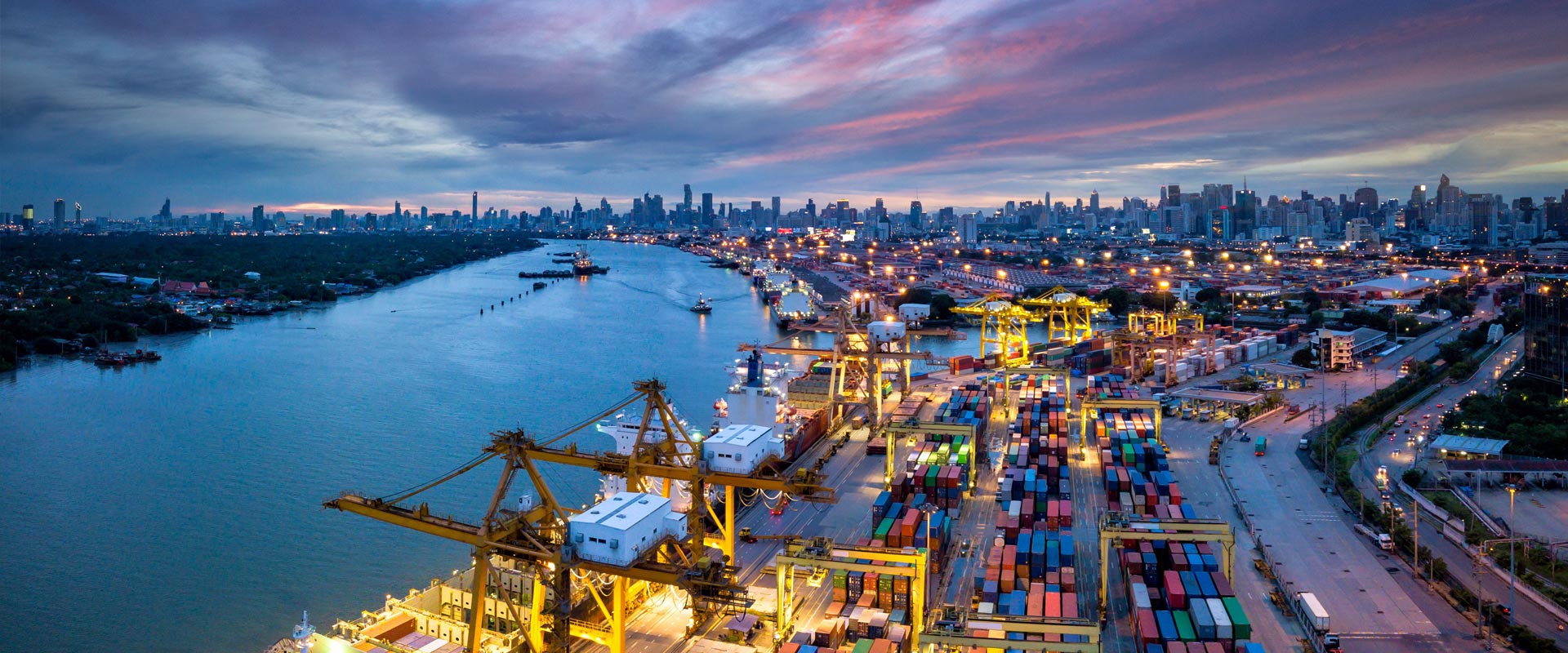- Amidst volatile conditions, companies seek growth abroad.
- Expanding internationally raises concerns about market understanding, customer credit, and late payments.
- Partnering with Allianz Trade provides robust insurance cover, access to commercial data, and local expertise, safeguarding against export risks.
- Trade credit insurance enhances access to capital, strengthens credit management, and ensures transaction discipline.
Summary
Key Takeaways
Sign up for Insolvency Updates
Companies in markets around the world are having to learn to live with volatile business conditions. Macroeconomic and geopolitical upheaval, stubbornly high interest rates and inflation, interrupted supply chains and soaring shipping costs, and rising insolvencies: that turbulent blend is not likely to disappear any time soon.
At the same time, many businesses are looking at their domestic markets and seeing lackluster opportunities. Europe and US growth rates, in particular, are expected to be stuck in the low single digits for at least the next two years. The Eurozone’s largest economies, for example, are predicted to grow by an average of 0.8% in 2024 and 1.7% next year; in the US the picture is for 1.4% in 2024 and 1.9% in 2025. 1
But that slow pace is not universal, and there are plenty of countries around the world where economic growth is still looking strong: India (6.5%), Turkey (3.9%) and Saudi Arabia (4.2%), to pick just three forecasts for 2025.
“This is one of the most turbulent business environments that most people have ever seen,” observes Peter Jackson, Head of Relationship Manager at Allianz Trade in the UK, “with little prospect of normalisation any time soon.” Moreover, people in countries that account for 60% of the world’s GDP are heading to the polls in the next year to elect new governments, adding to the atmosphere of uncertainly and potential instability, he says.2
With tepid markets at home, the situation is sending companies of all sizes in search of export opportunities – but with an understanding that they need to safeguard against the risks attached to taking on new international customers.
“With some markets closed, some markets interrupted, some markets difficult, some markets flat, clients are asking themselves, ‘Should we be looking at African countries, at India, at China, and elsewhere,’” says Jackson. “There are obvious opportunities out there, and digitalisation is making it increasingly easier and attractive to trade across borders.”
However, while there are certainly pressures to ramp up export activity, expanding into new territories is raising plenty of questions for finance teams about commercial risk:
- How can we get to grips with the nuances of trading in a new, unknown market?
- How do we get reliable information on companies who are keen to place orders with us?
- How do we analyze that information when we don’t speak the language or appreciate local financial reporting rules?
- What, if any, kind of credit limits should we set for new market customers in order to avoid undue risk?
- What happens when a buyer is several months late with a payment or goes bust?
Those questions are important for large corporates, but they are even more pertinent for small and medium-sized enterprises (SMEs), where a single large order that goes wrong can have a proportionally large impact on cash flow and the company’s overall financial health.
This is where a global trade credit insurance partner such as Allianz Trade can make the difference between a confident export strategy and one that doesn’t get off the ground – or worse, ends in substantial trading losses.
To provide you with robust insurance cover on your trading activities – no matter where those might be – Allianz Trade maintains a commercial information base of more than 83 million companies worldwide. It keeps a close eye on the creditworthiness of your existing and potential customers and dynamically sets an appropriate – and safe – credit limit, depending on their financial health.
Moreover, Allianz Trade has teams in 52 countries worldwide, including underwriters, legal experts and collections specialists, who understand local risk and the subtleties and challenges of country-specific business cultures. Crucially, with your receivables insured, Allianz Trade is ready to step in if an export opportunity turns sour by covering your losses.
That challenge becomes even more acute when a business is trading online. With orders potentially coming in from anywhere in the world, to offer net terms on a Buy Now, Pay Later basis, companies need instant checks on the creditworthiness of clients by carrying out real-time analysis as the customer is moving through checkout. That’s just what Allianz Trade pay e-commerce service is designed to do
Take the example of a Scotch whisky distiller that is benefiting from booming Asian demand for its rare malt whiskies. When a single cask of its product can be worth seven figures, the transaction values – and risks – are high. A recent order from a new Chinese buyer resulted in the distiller asking Allianz Trade to provide a credit limit of £1 million. While on the surface that looked high-risk, the insurer’s regional teams were able to access detailed information and local insight on the Chinese buyer and establish it was both bona fide and creditworthy, and advised the distillery it was happy to provide cover for the order.
Getting the kind of information that can safeguard a transaction is not always easy for a small or even mid-sized company, says Jackson. “A European or American SME asking a large Chinese company for a set of accounts that may contain commercially sensitive information is unlikely to go well. In contrast, a global entity such as Allianz Trade has the benefit of both reputation and a local risk team that can converse in the local language and, where necessary, sign a non-disclosure agreement to establish trust in the sharing of information,” he says. “For our clients, that takes away barriers to exporting.”
Having people on the ground helps in other important ways. In the case of late payments, it is important to have experts available who understand the local laws and rules for debt collection.
The rise in fraud – with criminals masquerading as companies placing orders – also makes Know Your Customer due diligence more important than ever for companies pursuing export opportunities. Again, having a partner with local presence in the market where your orders are coming from makes it easier to spot a potential fraud.
“All of these can be barriers – but only if you let them be. When your local markets are flat, it makes sense to look elsewhere, and we can see from our client activity that there are huge opportunities out there,” says Jackson.
But confidence is the key enabler of export strategies. Businesses hold back on giving credit that international customers seek because of concerns with risk, and credit insurance delivers the insight necessary to increase certainty in credit decision-making.
Jackson points to another recent client example. A small plant machinery supplier in the UK received an order valued at £257,000 from a new client in Germany. However, it felt that accepting such a large order from an unknown buyer would leave it overexposed in the event of late or non-payment, so it decided to only accept a part order of £43,000. However, on learning that Allianz Trade had analysed this company’s financial position and was willing to write cover for the total limit of £257,000, the parts supplier moved ahead with the full order. As a result, that customer is now one of its largest accounts. “Having that cover in place simply eliminated their apprehension,” he says.
While there may have been a perception that trade credit insurance is a facility more suitable for multinational corporations, that has now changed. “The export opportunity for SMEs is certainly there, and they are just the companies that can benefit most from the kind of support we offer,” he highlights. “That’s because they don’t necessarily have the expertise, they don’t have the global reach or the firepower behind their brand to enable them to get solid financial insight into export buyers. Trade credit insurance from a global provider like Allianz Trade helps by just taking that anxiety away and injecting confidence into export strategies.”
Learn more about how trade credit insurance can support your business’s export agenda.
1 – Global Economic Outlook 2023-25, Allianz Trade, Dec 2023 (PDF)
2 – Global Insolvency Outlook: Reality check, Allianz trade, Feb 2024
You might also be interested in…
What is credit control and how to implement a credit control process?
What can you do about an overdue invoice?
Late payments: how to collect and avoid them
Let's talk...
For a free credit insurance consultation call our UK team, 09:00-17:00 Mon-Fri.

Our expertise and commitment
Allianz Trade is the global leader in trade credit insurance and credit management, offering tailored solutions to mitigate the risks associated with bad debt, thereby ensuring the financial stability of businesses. Our products and services help companies with risk management, cash flow management, accounts receivables protection, Surety bonds, Business Fraud Insurance, debt collection processes and e-commerce credit insurance ensuring the financial resilience for our client’s businesses. Our expertise in risk mitigation and finance positions us as trusted advisors, enabling businesses aspiring for global success to expand into international markets with confidence.
Our business is built on supporting relationships between people and organisations, relationships that extend across frontiers of all kinds - geographical, financial, industrial, and more. We’re constantly aware that our work has an impact on the communities we serve and that we have a duty to help and support others. At Allianz Trade, we’re strongly committed to fairness for all without discrimination, among our own people and in our many relationships with those outside our business.




